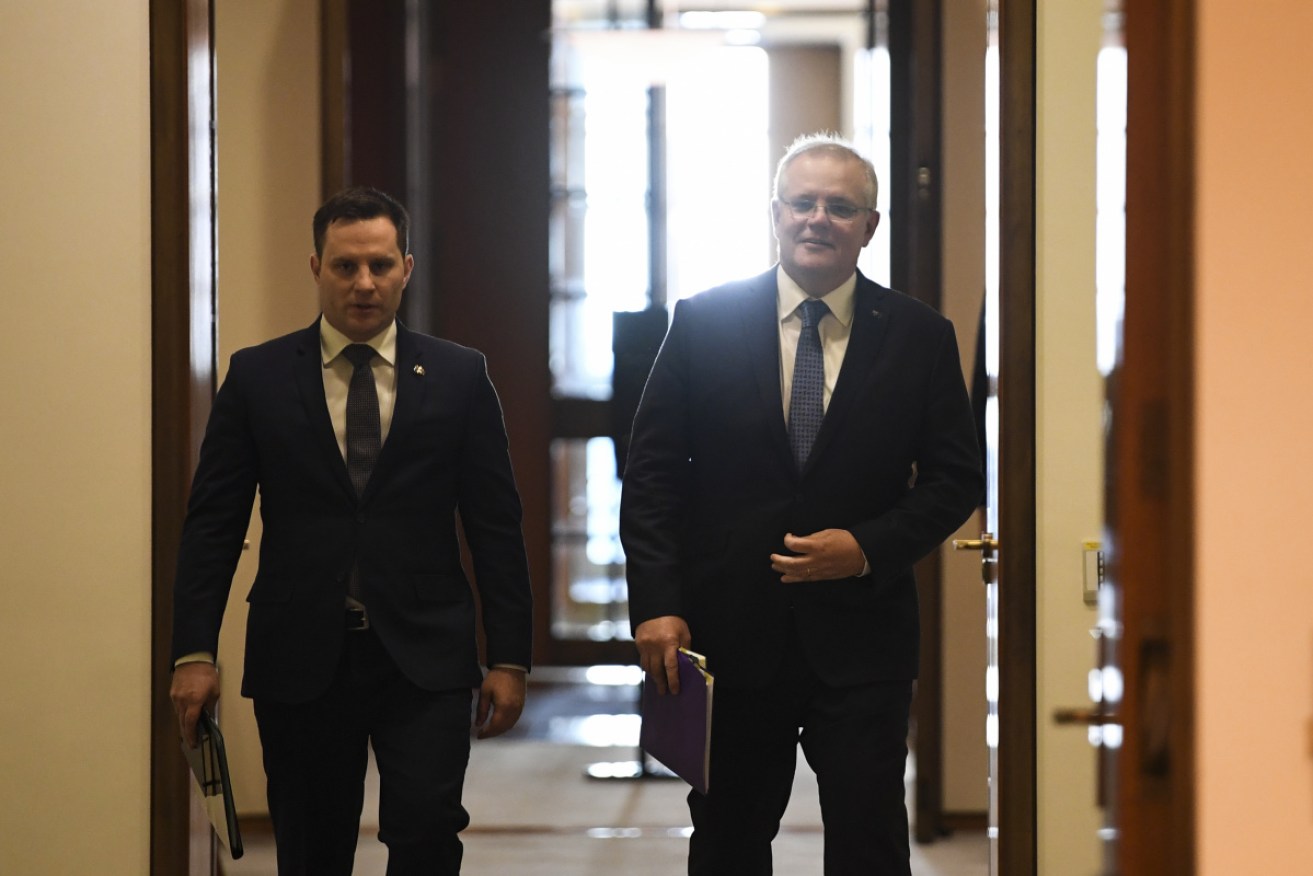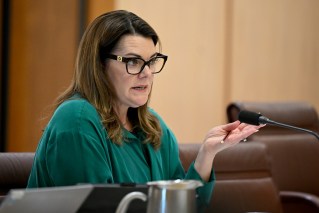Coalition fails to justify deportation ‘test’ as Labor folds


Immigration Minister Alex Hawke and PM Scott Morrison sought to force the hand of the NSW Liberal division. Photo: AAP
The government is struggling to justify legislation empowering the Immigration Minister to deport people guilty of the most minor criminal offences, as Labor backed a bill designed to “test” its national security credentials.
The ALP voted with the Coalition on Wednesday night in the House of Representatives to pass the changes to immigration law despite calls to block the bill.
Independent MP Andrew Wilkie and Greens leader Adam Bandt voted against its passage.
The bill, which Mr Wilkie said was a blatant attempt by the government to pander to racism, bigotry and xenophobia, is expected to face greater scrutiny when it is debated in the Senate, but it is unlikely to be heard before the election.
The vote comes amid opposition from experts, who say there is no apparent legal need for the government’s Migration Amendment (Strengthening the Character Test) Bill 2021, which seeks to explicitly lower the bar for cancelling people’s visas.
The bill would give the Immigration Minister the explicit right to cancel the visa of anyone convicted of an offence for which the maximum legal penalty is a two-year sentence.
But the new standards could apply regardless of whether the person is sentenced to the most minor of penalties, such as a fine, probation or even no criminal sanction.
The minister can already cancel temporary visa holders’ rights to stay in Australia under a character test.
Several experts argue that he already has alternative powers under the act relating to permanent visa holders, but its government backers argue these are open to judicial interpretation.
The bill is very similar to another introduced in October 2018 and which lapsed during the previous Parliament before returning again and being blocked in modified form.
Minister’s discretionary powers make bill ‘unnecessary’
Earlier this week Prime Minister Scott Morrison said the government was being prevented from deporting certain visa holders found guilty of crimes.
“He is clearly on the side of criminals,” Mr Morrison said of Labor leader Anthony Albanese during a talkback radio interview.

Immigration Minister Alex Hawke.
But Immigration Minister Alex Hawke declined to comment on Wednesday when asked by The New Daily to nominate specific cases or a number of cases in which the Immigration Minister had insufficient powers to deport a foreign citizen.
Immigration officials have previously been unable to identify specific cases or nominate a number of cases in which a lack of power by the minister has been a factor holding back the exercise of deportation powers.
Parliament’s human rights committee conceded that there was no obvious “pressing” or “substantial” need for the bill’s proposed measures.
“The bill’s new power is discretionary. It is impossible to know what the actual effect will be if passed,” said Henry Sherrell, the deputy director of the migration program at the Grattan Institute think tank.
“Some ministers may seek to use it frequently, others not at all.”
Last year, home affairs shadow minister Kristina Keneally said the proposal could lead to the cancellation of visas for “trivial” reasons.
But on Wednesday Labor confirmed it would no longer oppose the bill, which the government is planning to reintroduce into the lower house as it seeks to pick a pre-election fight on national security.
Mr Hawke has accused the ALP of reserving its position on amending the bill when it reaches the upper house, where it could seek to introduce amendments.

Home Affairs Minister Karen Andrews.
Home Affairs Minister Karen Andrews, meanwhile, says Labor has set a “test for itself” on national security, one which it has failed to provide evidence it can meet.
Current migration law, most recently amended by the Abbott government, allows for the automatic cancellation of people’s visas if they are sentenced to prison terms of one year or greater.
Those 2014 amendments resulted in a large increase in visa cancellations.
Mr Sherrell said the proposal threatens to deepen a diplomatic rift with New Zealand, the country to which the greatest number of visa holders are currently deported.
In several high-profile cases, visa holders who have lived in Australia for the vast majority of their lives but who remain sole citizens of New Zealand or other countries have been deported under the minister’s existing, discretionary powers.
“We are the [international] outlier when it comes to cancelling visas for long-term residents,” Mr Sherrell said.
“Very few other countries have mandatory cancellation laws akin to ours.”
‘A blunt tool’
The new bill has been called “unnecessary” by the Law Council of Australia, sentiments shared by other experts.
Last October the bill was blocked by cross-benchers, Labor and the Greens, with fears it would create a discriminatory legal regime.
Hannah Dickinson, the principal solicitor for the Asylum Seeker Resource Centre, said the proposal would not bridge any obvious legal gaps or needs for a crackdown on crime, but would subject vulnerable visa holders to arbitrary scrutiny.
“This bill does not increase the minister or the department’s power; the minister already has the power to cancel or refuse the visas,” Ms Dickinson said.
“It’s routine that visas are refused for much less serious offending.
“I haven’t heard of a single example of a case where the department wants to cancel the visa of a single case but don’t have the power.”
But Ms Dickinson said the amendments would introduce an ambiguity in law that would likely be turned upon those with the least ability to defend themselves against government power.
“It’s a blunt tool,” she said.
“It’s really unspecific and unclear.
“It’s going to differ from state to state [based on criminal codes]. It puts a lot more burden onto administrative decision makers, which is going to flow onto the courts.”
Ms Dickinson said the law ostensibly sought to crack down on problems such as family violence but provided no clear legal definition of such crimes.
She said it also raised the possibility that people who had been granted refuge from persecution under foreign regimes but had been found guilty of minor offences could be subject to indefinite immigration and left in limbo as they were not legally allowed to either live in Australia or be deported.
“We already have people languishing in our immigration detention facilities indefinitely,” she said.
“This makes that situation more likely.”








